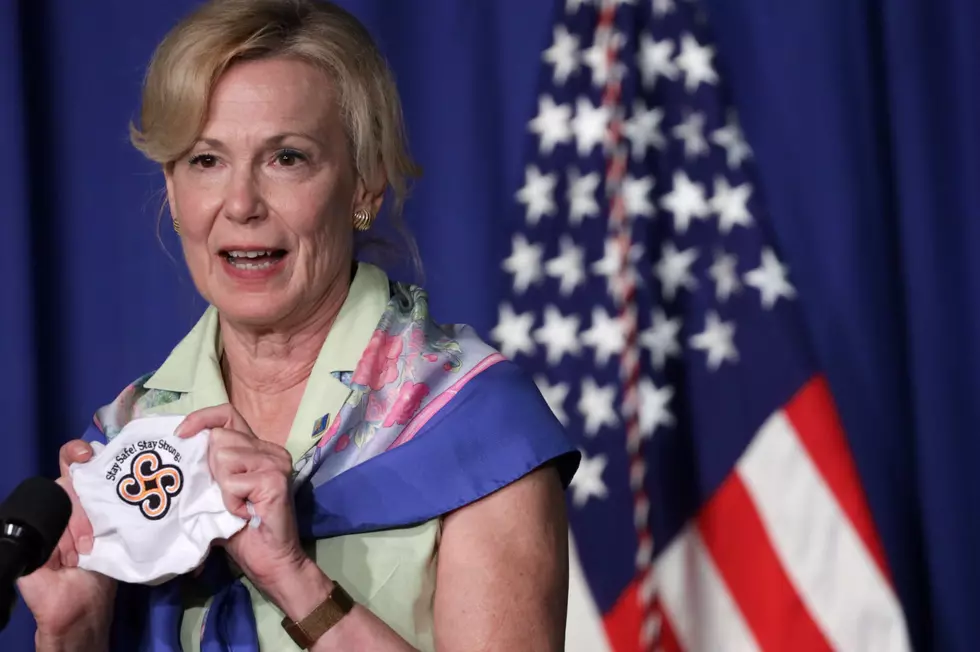
NJ mask-wearing rule: When, where and other questions answered
After weeks of encouraging mask wearing whenever social distancing is not an option, New Jersey has joined more than a dozen states in requiring it during the pandemic.
New Jersey had been among the first states to require face coverings in certain indoor settings involving essential businesses, but had resisted a mandate about outdoor usage.
“The hotspots we’re seeing across the nation and certain worrisome transmission trends in New Jersey require us to do more," Gov. Phil Murphy said Wednesday in signing the new executive order.
"In the absence of a national strategy on face coverings, we’re taking this step to ensure that we can continue on our road back as one New Jersey family," Murphy said.
The following is a breakdown of the state's directive on when and where face coverings are required, and under what penalties.
Where are masks required in New Jersey, as of July?
Face coverings are required in outdoor public spaces "when it is not practicable to socially distance" keep a 6-foot distance from others, according to the directive. Masks are not required when in the company of immediate family members, caretakers, household members or romantic partners.
Masks already were required and continue to be in indoor spaces accessible to the public, such as retail, recreational, and entertainment businesses, areas of government buildings open to the public, and within mass transit buses, trains, and stations.
Is anyone exempt from the mask requirement?
Children younger than 2 years old should never wear a mask because they risk suffocation, according to the Centers for Disease Control and Prevention. The New Jersey mandate exempts toddlers younger than 2.
Masks are not required in a case by case basis, "where doing so would inhibit that individual’s health."
The mask directive also does not apply to child care centers, child care facilities and youth summer camps. Those situations are advised to practice social distancing and extra sanitization efforts, based on a previous executive order this season.
When is it OK to remove a face covering, while in public?
Eating, drinking and swimming are among situations where individuals cannot feasibly wear a face covering, as detailed by the state directive.
Does the mask requirement apply to indoor workplaces?
Indoor commercial spaces that are not open to members of the public, including office buildings, must have policies that at a minimum “require individuals to wear face coverings when in prolonged proximity to others,” according to the state directive.
What is the penalty for not following the mask requirement?
Violation of the mask wearing directive is considered a misdemeanor, or a disorderly persons offense. That is punishable by jail time of up to six months and/or a fine of up to $1,000, at the "discretion of the court."
Why does the CDC recommend wearing face coverings during the COVID-19 pandemic?
"Cloth face coverings are recommended as a simple barrier to help prevent respiratory droplets from traveling into the air and onto other people when the person wearing the cloth face covering coughs, sneezes, talks, or raises their voice. This is called source control," according to the CDC website.
Federal health experts say there is emerging evidence from clinical and laboratory studies that shows cloth face coverings reduce the spray of droplets when worn over the nose and mouth.
The CDC also recommends that for younger children, wearing of a cloth face covering may be prioritized at times when it is difficult to maintain a distance of 6 feet from others, such as when standing in line at school.
Does mask wearing weaken a person's immune system?
"There is absolutely no scientific evidence that mask wearing or physical distancing weakens the immune system," according to the American Lung Association.
The ALA also noted that the initial significant shortage of masks for frontline workers in early spring was why authorities were reluctant to recommend mask wearing to the general public.
Are there other states that require masks outdoors?
Yes. As of July 9, at least 14 other states require face coverings in public spaces, including New York, Pennsylvania, Delaware and Connecticut. In Texas and Ohio, face coverings are required in the counties with the highest rates of COVID-19 infection.
More From Townsquare Media:

”Signs
More From 105.7 The Hawk










